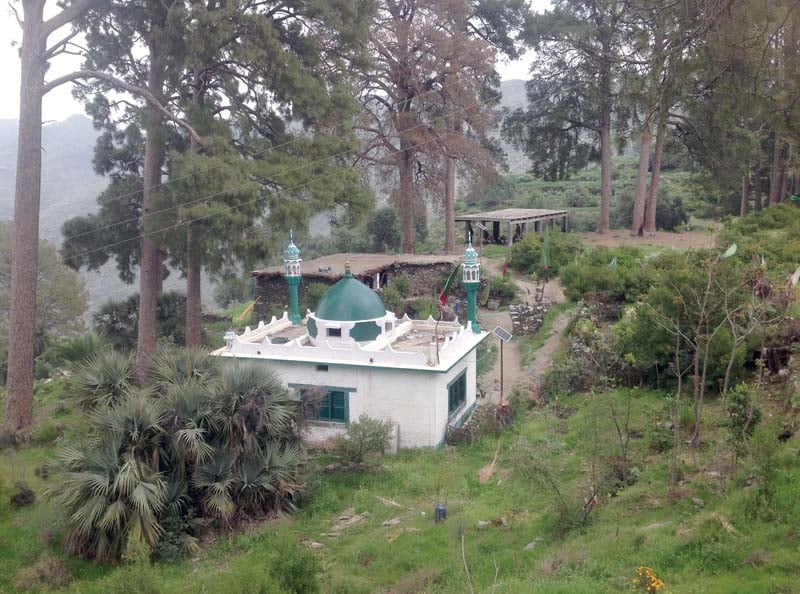
Some 60 kilometres north of Peshawar, Yousaf Baba’s shrine garnered enough popularity to become a frequented picnic spot. Yet, located in Prang Ghar, Mohmand Agency, the area remains quite underserved in terms of basic infrastructure and amenities.
At the confluence of Mohmand, Bajaur and Malakand, Yousuf Baba area takes its name from the Sufi saint. The guardian of the shrine, Waheed Gul—a walking jukebox of local history—says Yousuf Baba belonged to the 17th or 18th century. He believes—allowing some room for anachronism in oral history—Yousuf Baba was a pupil of Syed Kastir Gul better known as Kaka Sahib or Shaikh Rahamkar. Kaka Sahib’s grave is in Nowshera district and is said to be a contemporary of Emperor Akbar (1542-1605).
In the past, Gul says Yousuf Baba’s urs was an annual spring highlight; drawing hordes of his followers and with them some income. As militancy penetrated and attempted to rewrite local traditions, Yousuf Baba area got less foot traffic but still retained some bragging rights as a picnic spot.
“Since it is close to Charsadda, the young, the old, men and women all come to enjoy its natural beauty,” adds the caretaker.
Eye of the beholder
Locals, however, have a shifting perspective about living amidst nature, no matter how beautiful it seems to the outsider.
“Our children can study, but not beyond grade five,” says Anayatullah Khan, who lives there. “The school was upgraded to a middle school but the teachers have not ‘allowed’ its progress.”
There are high schools and middle schools for boys about 15km from Yousuf Baba. “But why can’t both our girls and boys get further education?” he asks.
Listing Yousaf Baba area’s extensive drawbacks and missing facilities, Anayatullah tells The Express Tribune locals feel neglected by the government, which has made its presence known in other ways.
In 2014, when the political administration of Mohmand came to raze poppy fields, teams of journalists—including from The Express Tribune—were present to witness the promises. Anayatullah says most of those were false.
“They destroyed the poppies and then never looked back,” says Anayatullah. “Even the seeds and fertilisers for alternative crops made it to the agency, but no one came to distribute them here.” He says the materials mostly went to areas where farmers had strong ties with the political administration.
Admitting to the fount of natural beauty, resources and a fertile climate, he says these need to be augmented with proper management and infrastructure. “The government did construct roads but those were never fixed once they fell apart after rain and landslides.” Even visitors complain, he says, but the political administration hardly ever shows interest in repairs.
Health care is another area of concern, according to locals. Most community health centres are non-functional and those who can, go to Charsadda in case of an emergency. Anayatullah says, the rest depend on local practitioners who are without certification or quacks.
With the presence of natural spring water, locals complain the government only needs to install pipelines to ensure supply.
Daulat Khan, a local, says the forests of the area give people several resources such as herbs and raw material to make rope. “But woodcutters from other districts come and chop trees down without any hesitation; the forest department has not planted a single tree,” says Daulat. “They only cut them down. If this deforestation continues over the next few years, the administration would have let a fertile, green mountain go barren.”
Mohmand political administration’s local official, Guncha Gul, told The Express Tribune there were plans to improve Yousaf Baba. “The government did neglect the area in the past, but we are now focusing on developing it.” People will soon feel the change, says Guncha.
Published in The Express Tribune, April 3rd, 2015.



1729137363-0/Liam-Payne-fans-(1)1729137363-0-165x106.webp)







COMMENTS
Comments are moderated and generally will be posted if they are on-topic and not abusive.
For more information, please see our Comments FAQ